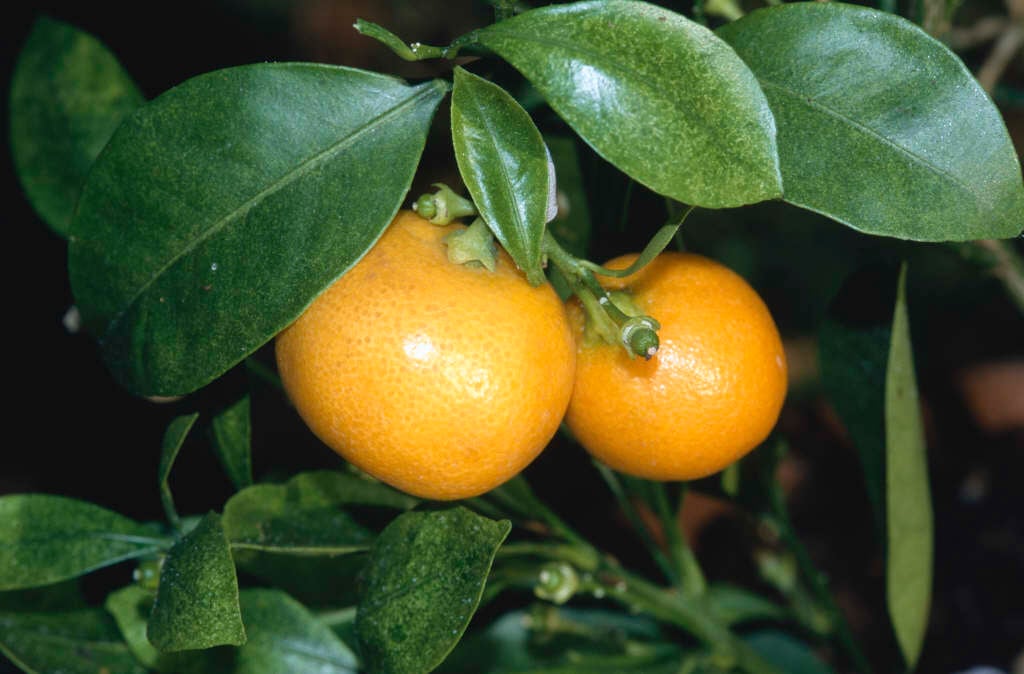Citrus × microcarpa (F)
calamondin
A bushy evergreen shrub to 4m tall, with elliptic, glossy rich green leaves and small, fragrant white flowers followed by spherical orange fruits 3-4cm across. Although the fruit is edible and the peel sweet, the pulp is very sour and acidic
Synonyms
× Citrofortunella mitis 'Calamondin'Citrus × mitis 'Calmondin'
see moreCitrus madurensis Calamondin
Citrus × mitis
Citrus calamondin
Citrus citrofortunella mitis
Citrus × microcarpa Philippine lime
× Citrofortunella microcarpa
× Citrofortunella mitis

Buy this plant
Size
Ultimate height
2.5–4 metresTime to ultimate height
5–10 yearsUltimate spread
1.5–2.5 metresGrowing conditions
Moisture
Moist but well–drainedpH
Acid, NeutralColour & scent
| Stem | Flower | Foliage | Fruit | |
| Spring | White | Green | ||
|---|---|---|---|---|
| Summer | White | Green | ||
| Autumn | Green | Orange | ||
| Winter | Green |
Position
- Partial shade
Aspect
East–facing or West–facing
Exposure
Sheltered Hardiness
H3Botanical details
- Family
- Rutaceae
- Native to GB / Ireland
- No
- Foliage
- Evergreen
- Habit
- Bushy
- Potentially harmful
- Fruit harmful to skin with sunlight/skin allergen (lemon and lime-bearing Citrus only). Wear gloves and other protective equipment when handling
- Genus
Citrus are typically evergreen shrubs or trees, frequently spiny, with simple, leathery, aromatic leaves, usually with winged stalks, and often fragrant white or pink-tinged flowers, followed by large, juicy fruits
- Name status
Correct
- Horticultural Group
- This genus produces fruit, but not necessarily edible fruit
- Plant range
- Philippines
How to grow
Cultivation
Grow as a conservatory or greenhouse plant, in a container of peat-free, loam-based potting compost with added grit, in full light, with shade from hot sun. In growth during spring and summer, water freely, and mist daily. Apply fertilisers formulated for citrus, throughout the year, following the manufacturer’s instructions; water sparingly in winter. See citrus cultivation for further information
Propagation
Propagate by seed at 16°C in spring; seedlings do not come true to type. Propagate by semi-ripe cuttings in summer
Suggested planting locations and garden types
- City and courtyard gardens
- Coastal
- Patio and container plants
- Edible fruit
Pruning
Pruning group 1; restrictive pruning under glass in winter or early spring
Pests
May be susceptible to citrus red spider mite and glasshouse red spider mite, soft scale and fluted scale, aphids, caterpillars and mealybugs under glass
Diseases
Generally disease-free
Get involved
The Royal Horticultural Society is the UK’s leading gardening charity. We aim to enrich everyone’s life through plants, and make the UK a greener and more beautiful place.